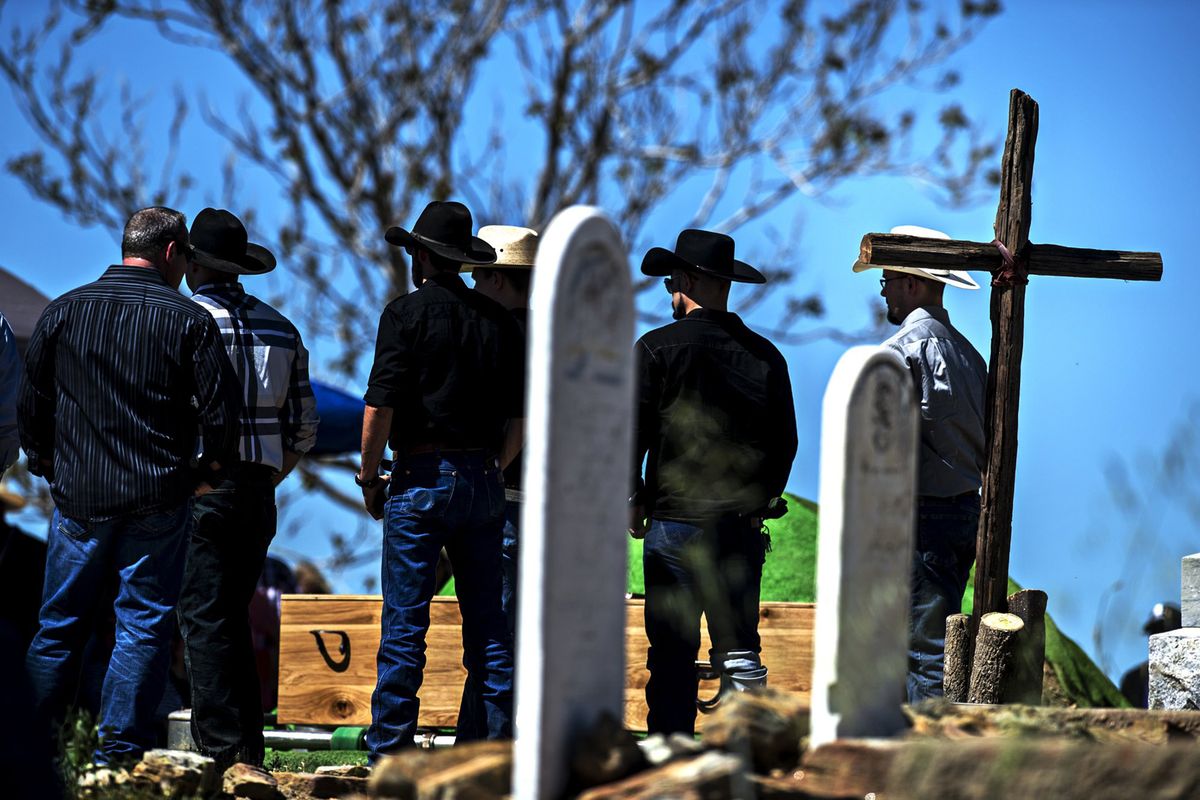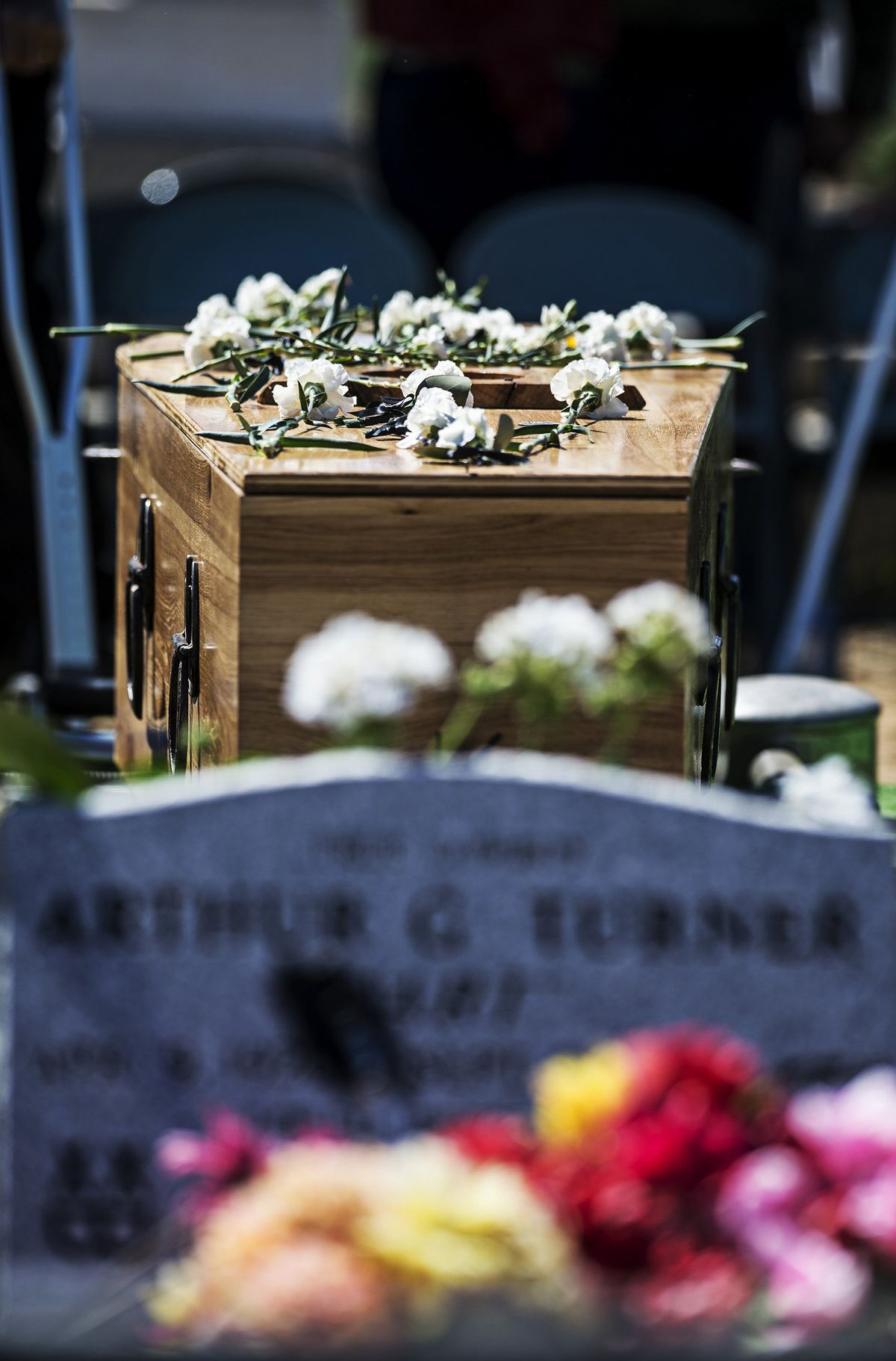Fitting farewells
Their final wishes met, two cowboys rest in peace
A wooden cross stands near the burial site during the funeral for Bob Wood at St. Catherine’s Catholic Church on March 27 in Hornitos, California.
HORNITOS, Calif. – On a hilltop in Hornitos, with the ranch they both loved within view, two men linked by mutual respect, the cowboy way and final requests are now separated by only thin walls of wood and a few feet of dirt.
Shortly before a heart attack claimed Art Turner a few years ago at his family’s 140-year-old ranch in the tiny Mariposa County town, he left instructions for Bob Wood, a loyal friend and fellow cattleman.
“ ‘Make sure Bob makes me a casket,’ ” said Terry Robinson, Turner’s nephew.
Turner, 84, died shortly after pulling on his boots one morning in September 2012. He’d planned to saddle up the horses so he, his brother Gene, Tami Turner and friend Gary Thompson could ride out onto the 1,000-acre ranch and move cattle.
It’s the way cowboys are supposed to go, they’ll tell you. With their boots on.
Wood and Thompson, his best friend and a fellow rancher, honored Art Turner’s request. They built him a casket of gorgeous cedar planks. They fashioned horseshoes into the handles the pallbearers used to carry it. Family and friends burned their cattle brands onto the lid. And on a sunny fall day, Gene Turner led Art’s riderless horse ahead of the hearse to the grave site amid the golden-brown foothills surrounding the cemetery next to the Catholic church in Hornitos. Hundreds of people attended.
“It was the only time I’ve ever seen a traffic jam in Hornitos,” said Tim Helton, a longtime friend of all involved.
Someone placed a bottle of Jack Daniels atop the casket, and many folks took a sip, some a chug. Next, kin took turns driving old-style square nails – once part of the ranch’s barn – into the top of the box.
Finally, they lowered the casket into the ground, but they didn’t leave the rest to the gravedigger.
“Up until 100 years ago,” Robinson said, “family buried family.”
And so they buried Turner, taking turns with the shovels until the mound of dirt next to the grave in the small cemetery disappeared.
They’d honored their friend their way, the way of the Old West that survives to this day on a ranch started in the 1870s by William T. Turner, the first of three family members to serve as Mariposa County’s sheriff.
“He didn’t carry a gun,” great-great-grandson Robinson said. “He’d wait until the bad guys fell asleep. Then he’d hit ’em on the head with an ax handle and take ’em in.”
Wood, who lived in Empire, Calif., and worked in construction, joined the family when he married Art Turner’s niece and Robinson’s sister, Kathy. The family refused to let go of him when the couple divorced after two decades.
“He fell in love with the ranch the first time I took him up there,” Robinson said.
Wood spent as much time there as he could, working with Art and the others and doing his best to eradicate wily predators that roamed the area looking for easy meals by killing newborn calves.
Like Art Turner a few years ago, Wood began a Saturday by heading out to saddle up the horses. He, Thompson and Tami Turner were going to ride out to check on the cattle, which they planned to gather for that Saturday’s branding. He bent over to clean out his horse’s hoof.
“He stumbled back,” Robinson said. “Gary saw him and asked, ‘You get kicked?’ ”
“No,” Wood answered, “I’m just a little dizzy.”
Thompson, though, immediately recognized it was much more than that. He told Gene Turner to call 911, and Wood soon found himself in a helicopter headed for Memorial Medical Center in Modesto. That dizziness turned out to be an aneurysm in his brain, and he wouldn’t survive it.
Like Art Turner before him, Wood – well before falling ill – had told friends what kind of casket he wanted when he died. No fancy metal job for him.
“Don’t you dare put me in a beer can with gold handles,” Wood would say. “You put me in a box.”
With Wood in the hospital and doctors offering no hope, Robinson called friend Mark Carvalho, who builds caskets and has donated some to the families of military veterans killed in action. Carvalho said he would need more than a week to finish it.
So Robinson decided he’d make it himself. Then Carvalho told him, “You buy the wood and I’ll make it for you.”
Wood wanted pine.
“I got him hickory,” Robinson said. “It’s as hard of a wood as you can get. He was hardheaded. It was fitting.”
Robinson dropped off the materials with Carvalho and went back to the hospital to see Wood.
“Three hours later, Mark called and said, ‘It’s done. Come pick it up,’ ” Robinson said.
Wood, 59, went quietly in the wee hours a few days later.
Robinson, Thompson and others did some alterations before taking the casket to the mortuary.
“We lined it with two deerskins, both (deer) he shot,” Robinson said. “And we put five coyotes (pelts, with heads still on) on the walls. They’ll be chasing each other around in a circle for an eternity.”
For comfort, they added a piece of fur from an elk that Wood killed. To the outside, they attached the extra horseshoe handles that Wood made when he built Art Turner’s casket.
And just as they did with Turner’s casket, they burned in their brands on the lid. In the warm afternoon, Thompson led Wood’s riderless horse ahead of the hearse carrying the casket made out of respect, love, tradition and the spirit of the Old West.
No Jack Daniels this time, but someone did lay a tin of snuff on the casket before friends and family took turns pounding the old-style square nails to secure it.
Then they lowered the casket into the hole in the ground and began shoveling in the dirt. Wood’s boots now rest just a few feet from Art Turner’s head in the next grave.
And as Art Turner and Bob Wood would have demanded, the others branded cattle at the Turner Ranch on that Saturday.
Another man short, and sadness in the saddles.

